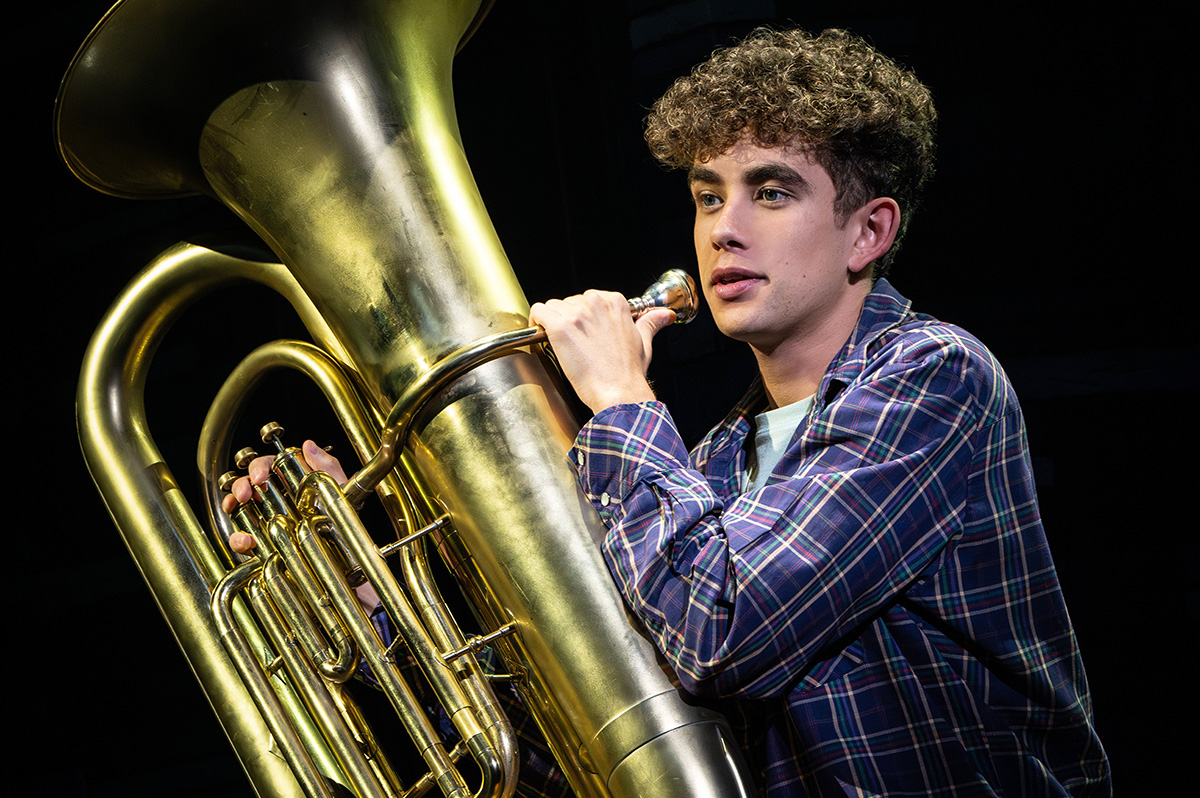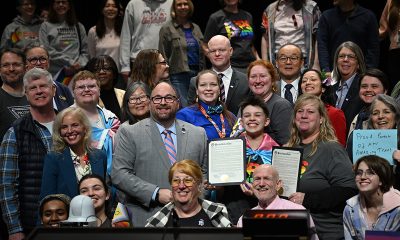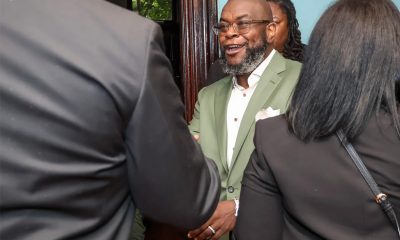Theater
Out actor Ángel Lozado on his new role in ‘In the Heights’
Lin-Manuel Miranda’s musical at Signature Theatre through May 4

‘In the Heights’
Through May 4
Signature Theatre
4200 Campbell Ave., Arlington, VA
Tickets start at $40
Sigtheatre.org
Before his smash hit “Hamilton” transformed Broadway, Lin-Manuel Miranda wrote “In the Heights,” a seminal musical set in an upper Manhattan barrio. Infused with hip-hop, rap, and pop ballads, the romance/dramedy unfolds over a lively few days in the well-known Latin neighborhood, Washington Heights.
Now playing at Signature Theatre in Arlington, “In the Heights” features handsome out actor Ángel Lozado as the show’s protagonist Usnavi de la Vega (named for a U.S. Navy vessel), a young Dominican American bodega owner who figures warmly in the center of the hood and the action.
A durable part that Lozado has wanted to play for some time, it’s proved the perfect vehicle to showcase his talents in a story that rings true to his heart.
WASHINGTON BLADE: Timing is very important to you.
ÁNGEL LOZADO: During rehearsal at Signature, our director James Vásquez said “In the Heights” finds you at a time when you need it. And that definitely resonates with me.
In the past I was up for Usnavi several times and then I was standby in the part for two weeks at the Muny in St. Louis but never called to go on.
And then, I lost my grandmother in January and was cast at Signature. In the show, the neighborhood loses their abuela [played by Rayanne Gonzales], I feel like I was meant to play the part at this moment. I’m a firm believer in the timing of it all.
BLADE: You’ve trained vocally at Florida State University, debuted on Broadway in “Bad Cinderella,” sang in “Jesus Christ Superstar Live (NBC),” and sung in many other musicals, but I’m guessing this is different?
LOZADO: Rapping is the most challenging part of the role. I’m trained in musical theater. I can sustain eight shows a week, but this is different. Rapping is more taxing. It’s challenging. With rap it’s clipped and the throat gets tighter.
BLADE: Like so much of Manhattan,Washington Heightshas changed a lot since 2008 when the show is set.
LOZADO: I currently live in Washington Heights and it’s very gentrified. Rents are high. I don’t think it was their intention to do a period piece but “In the Heights” is a period piece.
BLADE: And you grew up in Orlando, Fla., where before discovering theater, you were heavily into baseball.
LOZADO: I’m Puerto Rican, and baseball is a big part of our culture. My parents put me on a team at five, and I played first base through mid-high school. That was going to be a career. Went from one crazy career to another. When I got to high school, I was struggling with my queerness being in the sports world — struggled with my identity and the space I was in, I lost my love for baseball.
BLADE: How did you find your way to theater?
LOZADO: Through high school choir. It was a hard switch, but one that I couldn’t resist.
BLADE: You’ve been openly queer in the business. Has that ever been a problem?
LOZADO: I don’t know if it’s problematic or not. As actors, we don’t get behind the closed doors of casting. I do know that I’ve gotten to play lots of roles regionally that are straight men and that hasn’t been a problem.
Then again, I’ve cosplayed as a straight man most of my life. It makes me laugh when people see me offstage, they’re like, “Wow, you were really convincing as straight on stage.” I’ll take that compliment because that means I’m acting.
BLADE: Tell me about other roles you’ve played
LOZADO: Latin roles: Usnavi, Bernardo in “West Side Story,” Emilio Estefan in “On Your Feet!” and Che in “Evita.”And while I was thrilled to play those great parts, at the same time, I had friends getting auditions that weren’t specific to them being white, Black, or whatever. I worked with people who are more seasoned in the industry who had done 12 productions of “Evita.” I didn’t want to do that. I love representing my culture but I’d also like to do parts that have nothing to do with that. Dream roles include Sondheim’s “Sunday in the Park with George.”
BLADE: And how about a new work? Would you like creating a role on Broadway?
LOZADO: Oh yes, that’s the big dream.
BLADE: Do you think “In the Heights” might appeal to both Latin and queer audiences?
LOSADO: Yes.To see a people show themselves in a way that’s different from the stereotypes, telling our story in our own way, and not allowing the headlines define who we are, but to stand up in our joy.
“In the Heights” holds up the Latin community and, for me, that’s a parallel to the queer community, celebrating itself, especially in the upcoming time of WorldPride DC 2025 events (May 23-June 8).
Theater
Celebrated local talent Regina Aquino is back on the boards
Queer actor starring in Arena Stage’s ‘The Age of Innocence’

‘The Age of Innocence’
Through March 30
Arena Stage
1101 Sixth St., S.W.
Tickets start at $59
Arenastage.org
Actor, director, and now filmmaker, celebrated local talent Regina Aquino is back on the boards in Arena Stage’s “The Age of Innocence,” staged by the company’s artistic director Hana S. Sharif.
Adapted by Karen Zacarías from Edith Wharton’s 1920 masterpiece novel, the work surrounds a love triangle involving New York scion Newland Archer, his young fiancée, and the unconventional beauty Countess Olenska. The Gilded Age-set piece sets up a struggle between rigid societal norms and following one’s own heart.
Aquino — a queer-identified first-generation Filipino immigrant who grew up in the DMV— is the first Filipino American actress to receive a Helen Hayes Award (2019). She won for her work in Theater Alliance’s “The Events.”
In “The Age of Innocence,” Aquino plays Newland’s mother Adeline Archer, a widow who lives with her unmarried, socially awkward daughter Janey. No longer a face on the dinner party circuit, she does enjoy gossiping at home, especially with her close friend Mr. Sillerton Jackson, a “confirmed bachelor” and social arbiter. Together, they sip drinks and talk about what’s happening among their elite Manhattan set.
WASHINGTON BLADE: Do you like Mrs. Archer?
REGINA AQUINO: There’s a lot of joy in playing this character. She’s very exuberant in those moments with her bestie Sillerton. Otherwise, there’s not much for her to do. In Wharton’s book, it says that Mrs. Archer’s preferred pastime is growing ferns.
BLADE: But she can be rather ruthless?
AQUINO: When it comes to her family, yes. She’s protective, which I understand. When she feels that her family’s under attack in any way, or the structure of the society that upholds way of life is threatened, she leans hard into that.
The rare times that she’s out in society you see the boundaries come up, and the performative aspect of what society means. She can be very mean if she wants to be.
BLADE: Can you relate?
AQUINO: I come from a large Filipino matriarchal family. Mrs. Archer is someone I recognize. When I’m in the Philippines, I’m around people like that. People who will do business with you but won’t let you into their inner circle.
BLADE: Did you ever imagine yourself playing a woman like Mrs. Archer?
AQUINO: No. However, in the past couple of years diversely cast TV shows like “Bridgerton” and “Queen Charlotte” have filled a need for me that I didn’t I know I had.
With stories like “The Age of Innocence” that are so specific about American history, they aren’t always easily imagined by American audiences when performed by a diverse cast.
But when Karen [Zacarías] wrote the play, she imagined it as a diverse cast. What they’re presenting is reflective of all the different people that make up America.
BLADE: You seem a part of many groups. How does that work?
AQUINO: For me, the code switching is real. Whether I’m with my queer family, Filipinos, or artists of color. It’s different. The way we talk about the world, it shifts. I speak Tiglao in the Philippines or here I may fall into an accent depending on who I’m with.
BLADE: And tell me about costume designer Fabio Tablini’s wonderful clothes.
AQUINO: Aren’t they gorgeous? At the Arena costume shop, they build things to fit to your body. It’s not often we get to wear these couture things. As actors we’re in the costumes for three hours a night but these women, who the characters are based on, wore these corseted gowns all day, every day. It’s amazing how much these clothes help in building your character. I’ve found new ways of expressing myself when my waist is cinched down to 26 inches.
BLADE: Arena’s Fichandler Stage is theatre-in-the-round. Great for costumes. How about you?
AQUINO: This is my favorite kind of acting. In the round there’s nowhere to hide. Your whole body is acting. There’s somebody somewhere who can see every part of you. Very much how we move in real life. I find it easier.
BLADE: While the Gilded Age was opulent for some, it wasn’t a particularly easy time for working people.
AQUINO: The play includes commentary on class. Never mind money. If you’re not authentic to who you are and connecting with the people you love, you’re not going to be happy. The idea of Newland doing what he wants, and Countess Olenska’s journey toward freedom is very threatening to my character, Mrs. Archer. Today, these same oppressive structures are doing everything here to shutdown feelings of liberation. That’s where the heart of this story lands for me.
Theater
New D.C. theater season offers ‘Inheritance,’ ‘Vanya,’ more
Be sure to check out Baltimore, Rehoboth, Va. venues

As the crocuses burst, here’s some of what’s happening on the spring stage.
Clear Space Theatre in Rehoboth Beach presents Rodgers and Hammerstein’s “Oklahoma!” (through March 23), the classic “where the wind comes sweeping down the plains” story about a bucolic love triangle circa 1906. This production of the always [to me] surprisingly enthralling musical makes for the perfect early spring uber gay-friendly getaway. Clearspacetheatre.org
Closer to home, try taking a break from the unpleasant everyday and see “Golden Girls: The Laughs Continue” (March 16) at Capital One Hall in Tysons, Va. Enjoy Rose, Blanche, Dorothy and Sophia, those beloved characters (here played by actors in drag) lifted from the beloved sitcom. Livenation.com
GALA Hispanic Theatre presents the world premiere of “Sucede hasta en las mejores familias (Choke)” (April 24-May 18), a timely story about an older couple and their adult daughter whose family medical crisis unleashes intergenerational conflict that mirrors the battle that they’re forced to fight against a corporation. Galatheatre.org
For one performance only, the Alden Theatre in McLean, Va., presents “Forbidden Broadway” (Sunday, March 16, 2 p.m.). Filled with Broadway talent and tunes, and off-Broadway humor, this long-running New York favorite parodies current plays and musicals. Mcleancenter.org
There’s still time to catch Sara Bareilles’s “Waitress” at Olney Theatre Center (extended through April 6). The show is headlined by the Helen Hayes Award-winning out actor, single-named MALINDA who plays Jenna, the show’s titular server/baker in this story about love and self-exploration. Staged by Tony-nominated director/choreographer Marcia Milgrom Dodge. Olneytheatre.org
At Arena Stage, it’s “The Age of Innocence” (through March 30). Helen Hayes-winning actor Regina Aquino (a queer-identified first-generation Filipino immigrant) plays society stalwart Mrs. Adelaide Archer in Karen Zacarias’s adaptation of Edith Wharton’s classic Gilded Age New York-set novel. Arenastage.org
Signature Theatre’s production of Lin-Manuel Miranda’s “In the Heights” (through May 4) stars esteemed queer actor Ángel Lozada as the pulsating musical’s protagonist, the hardworking and awkwardly appealing Usnavi. Signaturetheatre.org.
Baltimore’s Hippodrome Theatre presents the national tour of “Shucked” (April 1-6), a queer comedy poised to deliver laughs and big talent. Its publicity reads: “What do you get when you pair a semi-neurotic, New York comedy writer with two music superstars from Nashville? A hilarious and audacious farm-to-fable musical about the one thing Americans everywhere can’t get enough of: corn.” Hilarious.
At National Theatre, there’s “Kimberly Akimbo” (May 20-June 1), the Tony Award-winning musical that portrays a quirky teen romance with a supporting quartet of queer characters. Broadwayatthenational.com
Historic Ford’s Theatre presents a staged reading of out playwright Matthew López’s Tony-winning, two-part milestone play, “The Inheritance” (May 28-June 1) inspired by E.M. Forster’s complex novel “Howards End.” López’s critically acclaimed epic explores the lives of three generations of gay men as they chart divergent paths to forge a future for themselves in an ever-changing America in the decades after the AIDS crisis. The staged reading is helmed by out director José Carrasquillo. Fords.org
Round House Theatre presents the premiere of Sharyn Rothsteins’s “Bad Books” (April 2- 27), featuring out actor Holly Twyford and Kate Eastwood Norris as opposing forces. “Twyford plays The Mother whose genuine love for and concern about her children propels her to seek out the local librarian to discuss ‘appropriate’ reading material. Norris plays The Librarian, a woman who is equally committed to her calling and profession.” Round House artistic director Ryan Rilette directs. Roundhousetheatre.org
At Constellation Theatre, it’s “Head Over Heels” (May 1-June 1). A jukebox musical featuring music of 80’s rock band The Go-Go’s. This celebration of self-discovery and queer identity, weaving together Renaissance romance and Greek comedy. The company’s artistic director Allison Arkell Stockman directs. Constellationtheatre.org
The last time I saw Anton Chekhov’s “Uncle Vanya” was in 2011 at the Kennedy Center’s Eisenhower Theatre featuring Cate Blanchett in a stunning turn as Yelena, a glamorous young woman married to an older processor. And now, the Shakespeare Theatre Company (STC) presents the heartbreaking comedy “Uncle Vanya” (March 30-April 20) starring Hugh Bonneville from TV’s “Downtown Abbey” as Vanya, the besotted brother of the professor’s late first wife. Shakesearetheatre.org
And finally, here’s something from the department of silver linings. After Trump’s Kennedy Center cancelled “A Peacock Among Pigeons: Celebrating 50 Years of Pride,” a concert featuring the Gay Men’s Chorus of Washington, D.C., the International Pride Orchestra will present the same concert at the Music Center in North Bethesda on June 5. Let’s make it sell out. Internationalprideorchestra.org
Theater
‘Kunene and the King’ makes US premiere in D.C.
Play takes place in post-apartheid South Africa

‘Kunene and the King’
Through March 23
Shakespeare Theatre Company’s Klein Theatre
450 7th St., N.W.
Tickets start at $35
shakespearetheatrecompany.org
Yes, it’s an apartment redolent with nostalgia and gin, but beyond the clutter and disorder, there’s evidence supporting the existence of a celebrated career that hasn’t entirely ended.
Set in contemporary South Africa, famed artist/activist John Kani’s two-hander “Kunene and the King” (now making its U.S. premiere at Shakespeare Theatre Company), has a lot to say in a little over 90 minutes.
The play’s characters are vestiges of their country’s past, and in 2019, 25 years after the end of apartheid, they express reaction to change in markedly different ways.
Jack Morris is an esteemed white Shakespearean actor (played by STC stalwart Edward Gero) who’s focus is drink and work. After being offered and accepting the title role in “King Lear,” a longtime goal, he is diagnosed with terminal liver cancer.
Undeterred, the irritable actor quits the hospital for home (a flat in an affluent Johannesburg suburb) where he can learn Lear and imbibe undisturbed. Increasingly unwell, he’s compelled to employ Lunga Kunene, a black South African nurse (Kani) to provide live-in care.
From the start, it’s clear this isn’t going to be an easy relationship. Jack suggests Lunga sleep outside of the apartment in the cleaners’ quarters, and casually shoots off offensive terms like “you people” and “helper” rather than nurse, a title that’s a point of pride for Lunga.
Kani’s dramedy unfolds a little clunkily before hitting a smooth stride. And while the men possess very different temperaments, they make disparate yet well-matched adversaries and occasional friends.
Costume designer Karen Perry has thoughtfully outfitted both men for the ride.
Lunga first appears in teal-colored scrubs with red epaulets covered in badges signifying a long and accomplished career in care, while Jack wears a lordly, velvet dressing gown that might have been culled from an old costume shop, but conveys a shabby grandeur nonetheless.
When Lunga spies a framed show poster featuring a dashing younger Jack as Richard II, he’s impressed. It’s here where the two men experience a bit of bonding over their mutual admiration for the Bard. Lunga’s exposure has been minimal—in the segregated education system of his youth, the Shakespeare reading list was limited to “Julius Caesar,” an historical tragedy that can be interpreted as a warning against the dangers of rebellion.
At one point, Jack recites a famous bit from the play (“friends, Romans, countrymen”) in English, and Lunga repeats the monologue in his native Bantu language.
After learning that Jack aims to take on Lear, Lunga tackles the tragedy. Reading “King Lear” over several weeks serves as an entry into aspects of Jack’s life. They have never been closer.
Other times, the employer and employee revert to old habits. They’re often at odds with Jack unwarrantedly threatening to fire Lunga over mostly imagined infractions and affronts.
Director Ruben Santiago-Hudson brings out both the work’s comedy and the drama.
As Jack, Gero is mostly buoyed along by an enduring ambition and gulps of alcohol. There is humor along with harshness and the glaring indignities of ravaging illness. Kani’s Lunga is fully aware of the gravity required by his profession, but he can’t seem to resist lapsing into jokes and easy smiles. It’s a keen and interesting portrayal of a character who’s seen a lot.
There have been disappointments. Lunga was on his way to becoming a doctor when the apartheid government put a stop to those plans; he became a nurse instead.
Just when Lunga takes a day off from work to check on his tidy little home in Soweto, a predominantly black township, Jack shows up unexpectedly. And he’s more than tipsy—yes, he’s still drinking. Ostensibly he’s come to have his nurse snap a promotional photo for “King Lear.” Despite circumstances, Jack yearns for a final triumph– he’s hellbent on playing the old king before his ghost light goes out.
The scene is partly funny, but it’s here that aspects of the lack of parity in the men’s relationship goes on full display.
STC’s production incorporates exciting scene transitions with statuesque singer Ntebo, garbed in a vivid gown and headwrap, musically conjuring the spirit of Africa.
While Lunga is able to embrace tradition, the ancestors, and modern medicine, Jack regards deference to that kind of cultural custom as so much hokum, beneath the dignity of an educated nurse.
Their worlds are different. While Jack’s ethnocentricity may prevent him from tangible change, there’s a lot here for the rest of us to consider.
-

 Virginia4 days ago
Virginia4 days agoFairfax County School Board issues Trans Day of Visibility proclamation
-

 Trinidad and Tobago5 days ago
Trinidad and Tobago5 days agoTrinidad and Tobago recriminalizes homosexuality
-

 National2 days ago
National2 days agoDestination Tomorrow works to empower LGBTQ community
-

 Congress4 days ago
Congress4 days agoChris Pappas reportedly planning run for US Senate












